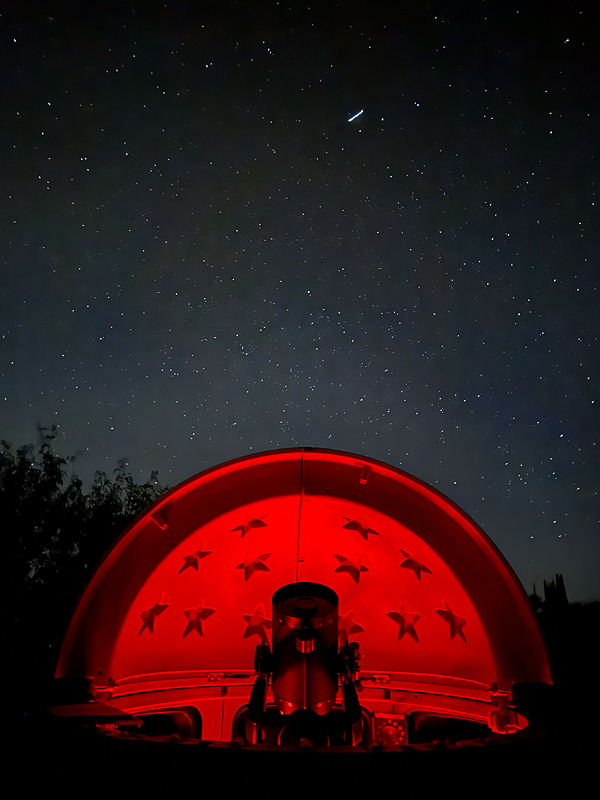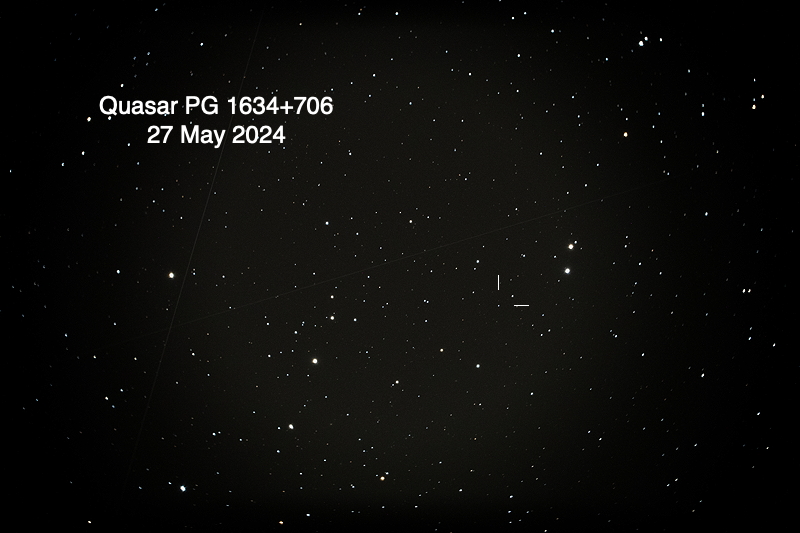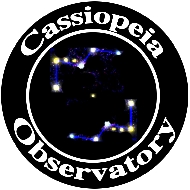Quasar PG 1634+706
Posted: 28 May 2024
|
Open: Monday, 27 May 2024, 1901 MST Temperature: 81°F |
Session: 1975 Conditions: Clear |
Equipment:
12" f/8 LX600 w/StarLock
2" 24mm UWA eyepiece
2" 14mm 100° eyepiece
12x50 binoculars
Camera:
iPhone 15 Pro Max
D850 DSLR
1909 MST: Relaxed on the observatory patio bench.
1926 MST: Sunset.
2000 MST: Back in the observatory. Prepared the D850 DSLR for imaging later.
2007 MST: Back to relaxing on the bench to watch the stars come out.
Did some observing using 12x50 binoculars: Castor and Pollux (both stars visible in the same field-of-view), Omega Centauri (globular cluster), Mizar (double star), M13 (Great Globular Cluster in Hercules), M51 (Whirlpool Galaxy), and M57 (Ring Nebula).
During a bright pass of the International Space Station (ISS) in the northern sky, I took this handheld iPhone 15 Pro Max photograph of the ISS over Cassiopeia Observatory. It was taken with the Camera app (Night Mode, 10 seconds, 1X lens). Polaris (the North Star) is the bright star above the dome with the ISS near the bowl of the Little Dipper.

2120 MST: LX600 ON, StarLock OFF, High Precision ON.
Mounted the D850 DSLR at prime focus + focal reducer, focused on the star Vega, locked the 12" primary mirror, and then slewed to Quasar PG 1634+706.
2135 MST: StarLock ON.
Took this StarLock autoguided image (5 minutes, ISO 6400) of Quasar PG 1634+706, Mag. + 14.7, 9 Billion Lightyears away.

2148 MST: StarLock OFF.
I have now completed my Quasar Astrophotography Project, imaging 14 Quasars.
Viewed Epsilon Lyrae (the Double Double Star), 102X and 174X.
2159 MST: LX600 OFF.
2208 MST: Took a Sky Quality reading.
|
Close: Monday, 27 May 2024, 2210 MST Temperature: 70°F |
Session Length: 3h 09m Conditions: Clear, SQM 21.03 |
Comments are welcome using Email. Please read the Email Etiquette guidance.
Cassiopeia Observatory Home Page
Copyright ©2024 Michael L. Weasner / mweasner@mac.com.
URL = http://www.weasner.com/co/Reports/2024/05/28/index.html
